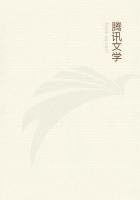My father was proud of his daughter-in-law and much gratified at his son's marriage. He was delighted with the manner in which she adapted herself to the ways of all her new relations, with her sweet attention to my mother, and, above all, with her punctuality. She had been warned beforehand by her husband that, to please his father, she must be always ready for family prayers, which were read every morning by him just before breakfast. This she succeeded in doing, never failing once to be on time. As breakfast was at seven o'clock, it was no small feat for one not accustomed to such early hours. She said afterward that she did not believe that General Lee would have an entirely high opinion of any person, even General Washington, if he could return to earth, if he were not ready for prayers! After a delightful visit of three weeks my brother and his wife returned home. Just as the latter was packing, my father came into her room and filled all the space in the top of her trunk with pecan nuts, which some friends had sent him from the South.
The hour fixed for the service in the college chapel was, as I have said, a quarter to eight o'clock every morning except Sunday. In the three winter months, December, January, and February, it was one hour later. As the president never failed to attend, when not prevented by sickness or absence, it was necessary to have an early breakfast.
After chapel he went to his office and was seated at his desk by eight o'clock, where he remained, unless called out by public business, till two P.M. This room was open to all in the college who had business with him. The new students were required to report to him here in person, and from their first interviews we obtained a knowledge of the young men of which he availed himself in their future career in the college. As president, he was always disposed to be lenient with students who were reported for disorderly conduct or for failure in their studies or duties. He would say to the faculty, when they seemed to think it necessary to send a student home:
"Don't you think it would be better to bear with him a little longer?
Perhaps we may do him some good."
Being sent for to this office was anything but pleasant to the students.
Lewis, one of the janitors, went around with the names of those the president wanted to see, written by his own hand on a long slip of paper. He carried the paper in one hand, a pencil in the other, and when he could find the one he wanted in a crowd of his comrades, he took special pleasure in serving his notice, and would say in his solemn, sepulchral voice:
"Mr. ---, the president wants to see you at the office."
Then Mr. --- took the pencil and made a cross-mark opposite his name, which was evidence of his having received his summons. What transpired at these interviews was seldom known, except as the student himself might reveal it; for unless it became necessary to summon the delinquent a second time, the president never alluded to the subject. An old student writes me the following account of his experience in the president's office:
"I was a frolicsome chap at college, and, having been absent from class an unreasonable number of times, was finally summoned to the General's office. Abject terror took possession of me in the presence of such wise and quiet dignity; the reasons I had carefully prepared to give for my absence stood on their heads, or toppled over. In reply to General Lee's grave but perfectly polite question, I stammered out a story about a violent illness, and the, conscious that I was at that moment the picture of health, I hastened on with something about leaving my boots at the cobbler's, when General Lee interrupted me: 'Stop, Mr. M---,' he said; 'stop, sir! ONE GOOD REASON IS ENOUGH.' But I could not be mistaken about the twinkle in the old hero's eyes!"
Only a few cases required more than one summons to appear at the office.
No instance is known where a student complained of injustice or harshness, and the effect on his mind was that of greater respect and admiration for the president.
The new house was approaching completion, and my father was much interested in the work, going there very often and discussing with the workmen their methods. That Christmas I spent two weeks in Lexington, and many times my father took me all over the new building, explaining all the details of his plan. All of his family were here together this Christmas except Fitzhugh and his wife, an occurence rather rare of late years. My father's health was unusually good, and he was bright and almost gay. He rode out often, taking me with him, as it was too cold for the girls. He also took me around with him visiting, and in the mild festivities of the neighbours he joined with evident pleasure. My visit ended all too soon, and the first week of January I started back to the "low country." Soon after my departure, he forwarded a letter to me with the accompanying one of his own:
"Lexington, Virginia, January 14, 1869.
"My Dear Rob: The accompanying letter was inclosed to me by Lawrence Butler [The grandson of Nellie Custis, my grandfather's sister, who married Lawrence Lewis, the favourite nephew of Washington] with the request that I would forward it, as he did not know your address, and urge you to be present at his wedding. I do not know that I can say more, except to inform you that he says he has the very girl for you if you will come on. You must therefore decide the question according to your best judgment. General Hoke, from North Carolina, has also sent you his wedding-cards. We have missed you very much since your departure, and wished you back. I hope you got home comfortably and found all well. Drive all your work with judgment and energy, and when you have decided about the house, let me know.















